Hair Growth And Thickness is important to your look and how you feel about yourself. Losing hair or having it grow thin can be really hard. If you’re shedding more than 100 hairs a day, it might mean something is wrong with your hair follicle health. This could be due to health problems, stress, or not getting enough vitamins.
If you see your hair getting thinner, it’s smart to talk to a doctor or dermatologist. They can help find out what’s causing your hair to fall out. Also, looking at what you eat can make your hair healthier. Living a healthy life is a big part of keeping your hair looking good. Sometimes, taking extra vitamins and minerals as dietary supplements can help too.
Key Takeaways
- Hair loss can be caused by various factors, including medical conditions, stress, and vitamin deficiencies.
- Consulting a doctor or dermatologist is crucial to identify the underlying cause of hair thinning or loss.
- Incorporating a healthy diet and lifestyle can help improve the health of your hair follicles.
- Dietary supplements may be necessary to ensure you’re getting the right vitamins and minerals for healthy hair growth.
- Patience and consistency are key when using hair growth supplements, as results may take several months to become visible.
Understanding Hair Loss and Its Causes
Losing between 50 to 100 hairs daily is fine. But losing more could mean trouble for your hair follicle health. Things like medical conditions, stress, and vitamin deficiencies can harm your hair. If you see thinning hair, talk to a doctor or dermatologist. They can help figure out why you’re losing hair.
Hair Shedding and Follicle Health
Losing up to 100 hairs a day is normal. But if you see a lot more, it might be a problem with your hair follicles. It’s key to keep your follicles healthy for healthy hair growth. This can help avoid thinning hair.
Factors Contributing to Hair Loss
Medical conditions, stress, and even vitamin deficiencies can lead to hair loss. Check your diet and try to live a healthy lifestyle. This can boost the health of your hair follicles.
The Role of Vitamins in Hair Growth
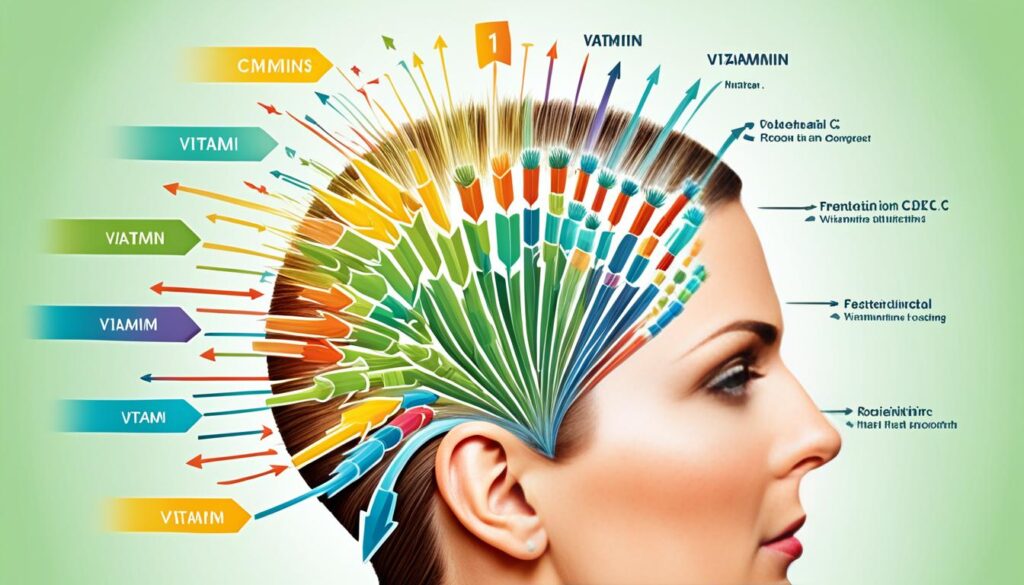
Vitamins are key for keeping your hair healthy and strong. They help with cell growth and stop damage from free radicals. They also prevent early graying and boost hair growth. Make sure to get the right mix of vitamins and minerals for thick, healthy hair.
How Vitamins Support Hair Health
Vitamins A, C, and E are powerful antioxidants. They protect your hair. Then, biotin helps make keratin, which is key for hair strength. Adding these to your diet or taking dietary supplements can really improve your hair.
Importance of a Balanced Diet
A balanced diet is crucial for good hair growth. It should be full of different vitamins and minerals. Eating fruits, veggies, whole grains, lean proteins, and healthy fats gives your hair what it needs to be strong and healthy. A balanced diet is a must for great hair.
Biotin: The Hair Growth Vitamin
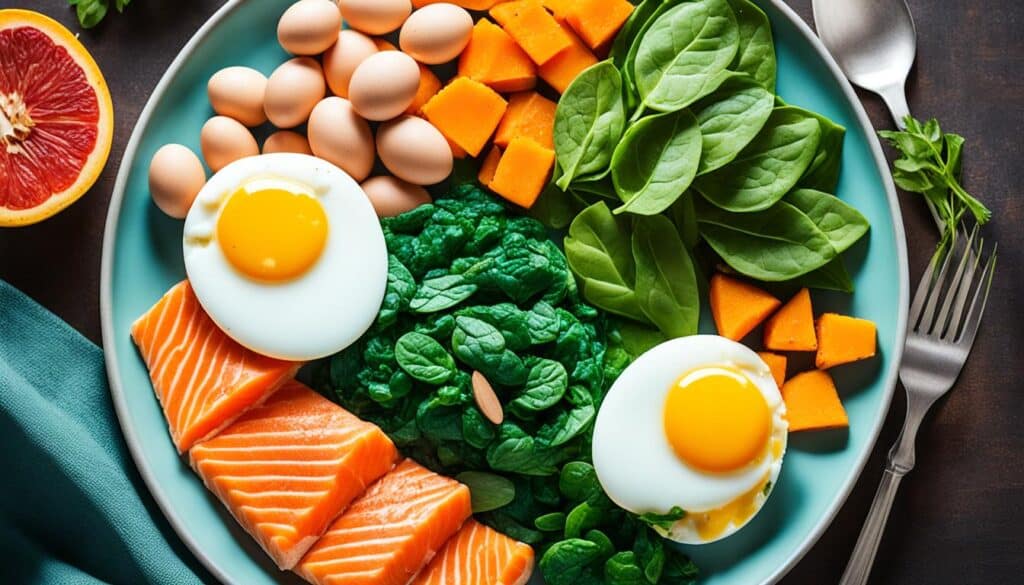
Biotin, also known as vitamin B7, is key for making your hair grow and become thicker. It boosts the making of keratin. Keratin is a protein needed for the health and growth of your hair.
Benefits of Biotin
Biotin makes your hair strands stronger and thicker because it increases keratin. This leads to better hair growth and less hair loss. Biotin also helps your hair follicles be healthy, so they can grow strong and vibrant hair.
It’s not common to lack biotin. The biggest reason for this is Biotinidase Deficiency. It’s a genetic issue that makes it hard for the body to use biotin well.
Food Sources of Biotin
Luckily, you can find biotin in many foods. Great sources are eggs, meat, fish, nuts, sweet potatoes, and seeds. By eating these foods, you help your hair grow and stay healthy.
Adults should aim to get 30 micrograms of biotin daily. This amount is easy to get from your diet. It’s very important for your hair’s health and look.
Vitamin A: Promoting Sebum Production
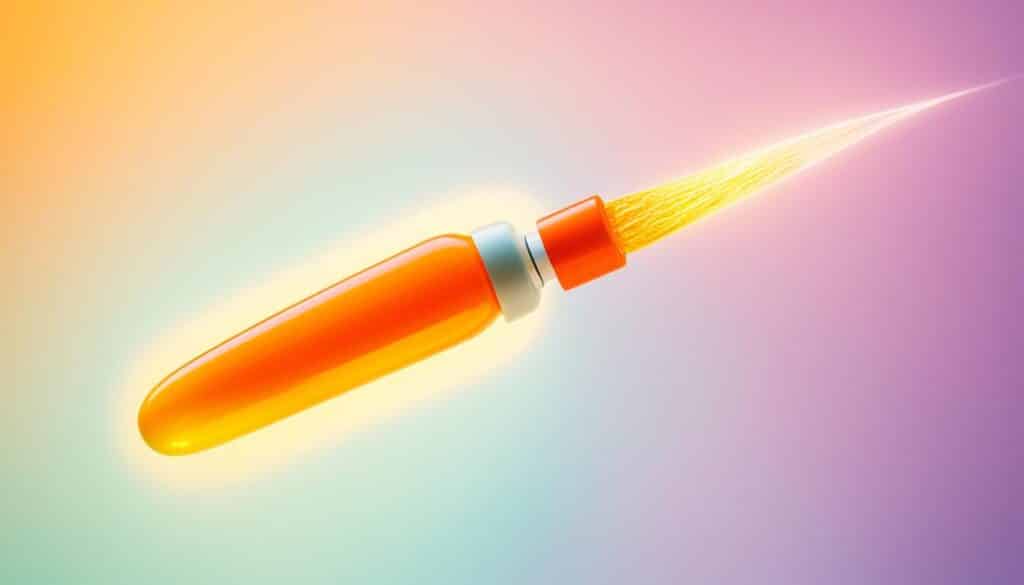
Hair cells grow super fast, making vitamin A crucial for their growth. It helps the body make sebum, which keeps the scalp and hair healthy. Without enough vitamin A, you might face hair loss.
The Importance of Vitamin A
Vitamin A is essential for your hair and scalp health. It controls sebum, which is key for good scalp and follicle health. Lack of vitamin A could make your hair dry and prone to hair loss.
Beta-Carotene-Rich Foods
Eat foods rich in beta-carotene for enough vitamin A. Great sources are sweet potatoes, pumpkin, carrots, spinach, and kale. Vitamin A is also in cod liver oil, eggs, yogurt, and milk. Men should aim for 900 mcg of vitamin A a day, while women need 700 mcg.
Vitamin C: Antioxidant Power for Hair
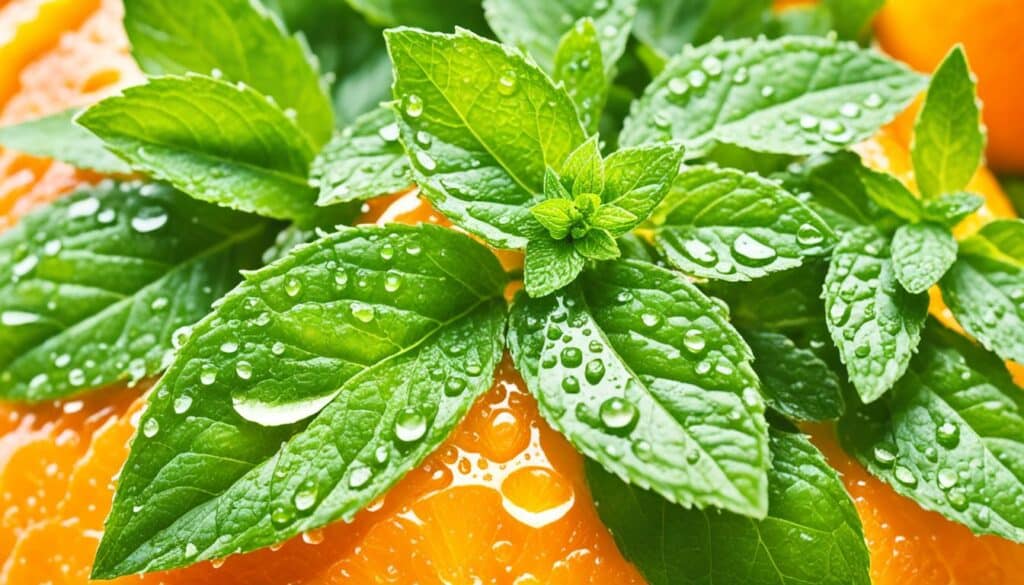
Oxidative stress can cause hair loss. It happens when there’s more free radicals than antioxidants in our bodies. This leads to an electron imbalance which can make you lose hair. Eating foods with lots of vitamin C is the key. It helps your body counteract the damage caused by free radicals. How? It balances out their electrons.
Combating Oxidative Stress
Vitamin C does a lot more than fight free radicals. It helps make collagen, keeping your hair from going gray early. It also helps your body absorb iron, which is good for hair growth. So, keeping a healthy balance of both antioxidants and free radicals is a big defense against hair loss.
Vitamin C-Rich Foods
Citrus fruits, peppers, strawberries, tomatoes, and guavas are packed with vitamin C. Your body doesn’t make vitamin C on its own, so eating these foods is crucial. Or you could take a supplement. Adults should aim for up to 90 milligrams of vitamin C a day (men) and 75 milligrams (women).
| Food | Vitamin C Content (per 100g) |
|---|---|
| Red Bell Pepper | 128 mg |
| Guava | 228 mg |
| Strawberry | 59 mg |
| Orange | 53 mg |
| Tomato | 13 mg |
Vitamin D: Preventing Hair Loss Conditions
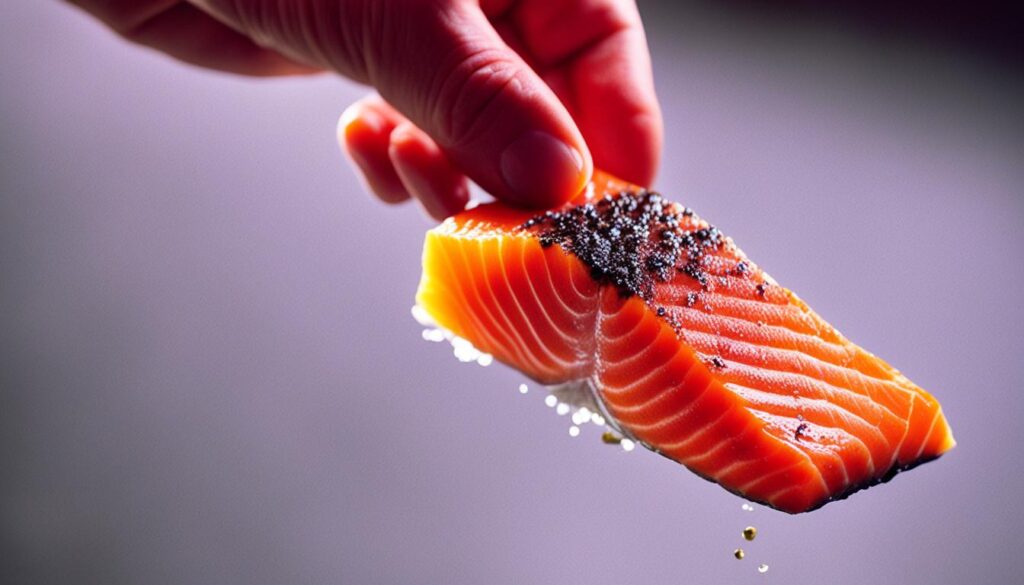
Vitamin D is crucial for healthy hair. Not getting enough can cause hair to fall out. People over 65 are more likely to have low vitamin D. Incorporate fatty fish and foods like eggs and yogurt into your meals. Or, you can soak up some midday sun. Aim for 600 IU of vitamin D each day.
Linking Vitamin D Deficiency to Hair Loss
Studies show a clear link between not enough vitamin D and hair loss. This includes alopecia and losing hair more than normal. So, it’s key to keep your vitamin D at a good level for your hair to grow well.
Sources of Vitamin D
Here’s how to get your daily dose of vitamin D:
- Fatty fish, like salmon and mackerel
- Cod liver oil
- Fortified foods, such as cereal and yogurt
- Mushrooms
Don’t forget about the sun. It’s also a great way for your body to make its own vitamin D.
Vitamin E: Antioxidant Protection for Hair
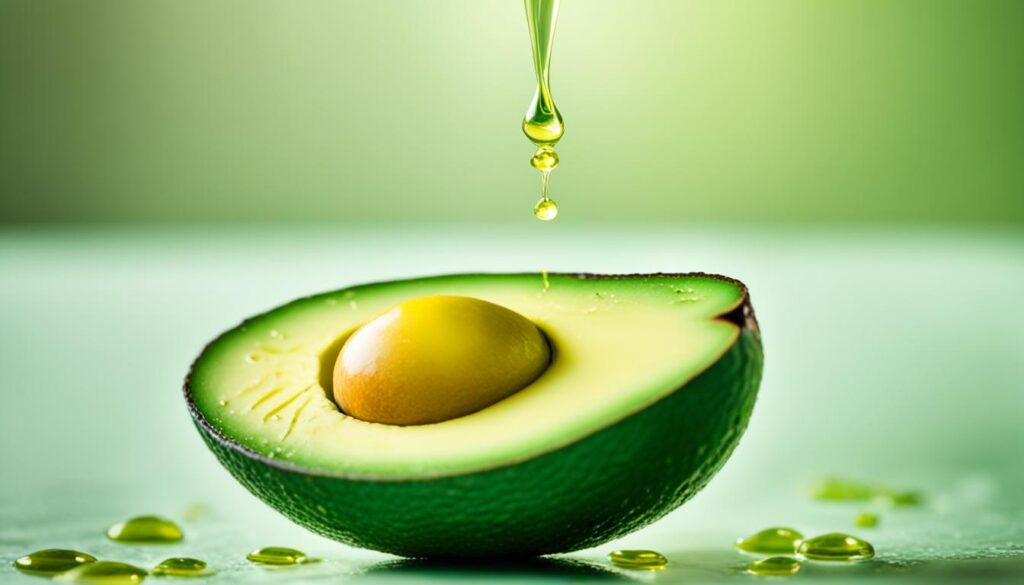
Vitamin E is like vitamin C in its ability to fight off damage. It stops free radicals from hurting our hair. This is really important because damaged hair can lead to hair loss. Some people are more likely to lack vitamin E, like those with health issues such as Crohn’s disease or cystic fibrosis.
Benefits of Vitamin E for Hair Growth
Vitamin E can help with hair loss. A small study found that taking vitamin E for eight months boosted hair growth by 34.5%. It keeps hair healthy by protecting hair follicles.
Food Sources of Vitamin E
You can get vitamin E from food and supplements. Foods like sunflower seeds, spinach, avocados, and almonds are rich in it. Eating these foods can improve your hair’s health and growth.
The daily recommended amount of vitamin E is 15 milligrams. It’s vital for keeping your hair care effective.
Hair Growth And Thickness: Vital Vitamins
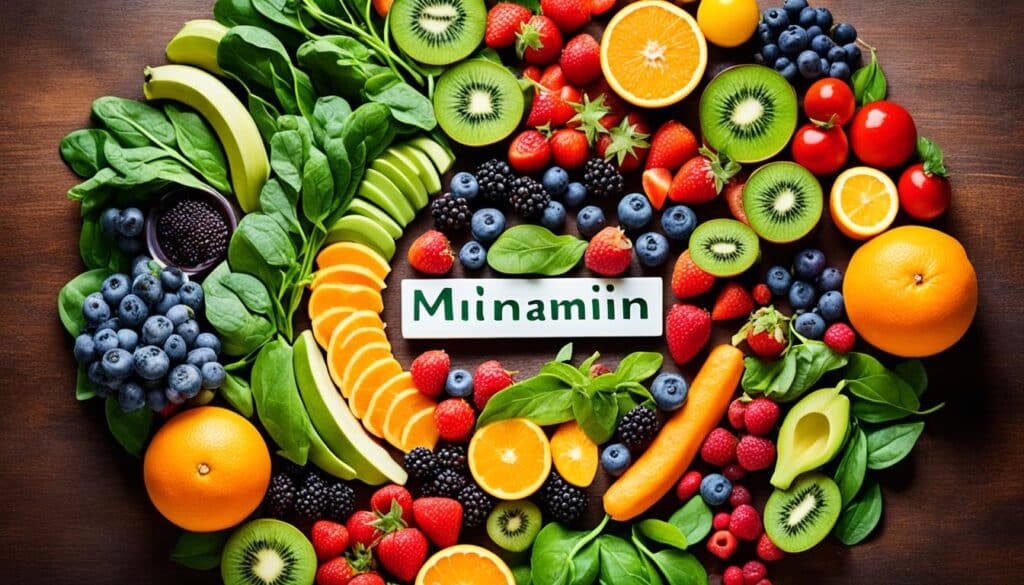
To get beautiful, thick hair, iron and zinc are key. They help your hair grow strong and full.
Iron: Fueling Oxygen Distribution
Hemoglobin, made with iron, carries oxygen in your blood. Oxygen is key for repair and growth. Not having enough iron can cause hair loss, especially in women. Foods like eggs and red meat, plus lentils and spinach, are good sources.
An intake of 45 mg iron per day is what you should aim for.
Zinc: Supporting Oil Gland Function
Zinc aids hair growth and keeps scalp oil glands healthy. A lack of zinc can lead to hair loss. Foods high in zinc include beef, spinach, and oysters. For men, 11 mg of zinc per day is advised. Women should aim for 8 mg.
| Nutrient | Function | Food Sources | Recommended Daily Intake |
|---|---|---|---|
| Iron | Supports oxygen distribution, aids in hair and cell repair | Eggs, red meat, lentils, spinach, oysters, clams | 45 mg |
| Zinc | Promotes hair growth, supports oil gland function | Beef, spinach, wheat germ, pumpkin seeds, oysters, lentils | 11 mg (men), 8 mg (women) |
Incorporating Hair Growth Vitamins
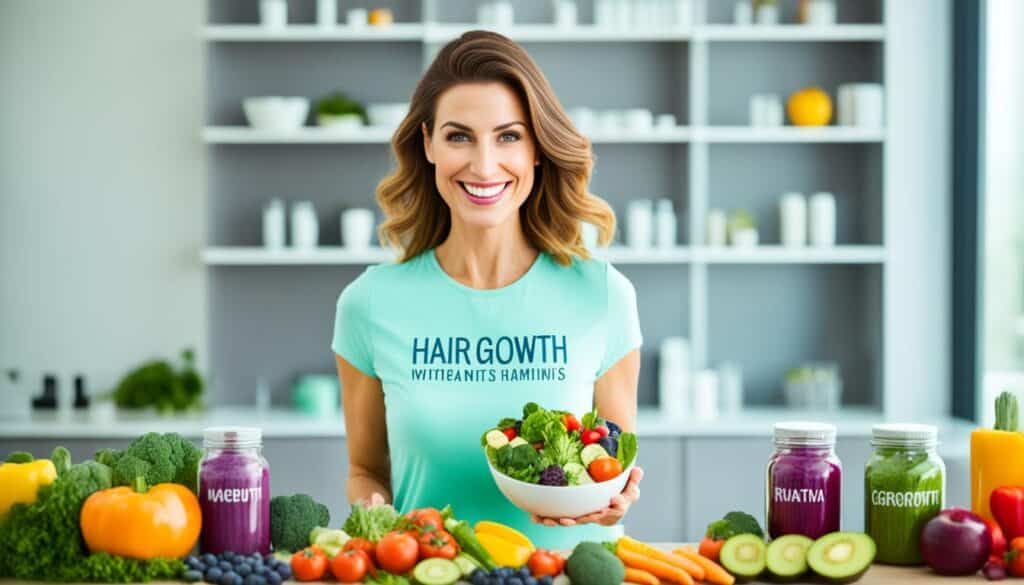
Hair supplements don’t give quick fixes. It can be a few months before you see changes. The results vary based on why you’re losing hair, your diet, and genes. If you’re losing a lot of hair, see your dermatologist. It could be because of your surroundings, a sickness, or something else. Your doctor can help. They might suggest vitamins or other treatments like medications or topical solutions.
Consulting a Professional
If your hair is falling out a lot or getting thinner, talk to a pro. A dermatologist can find out what’s wrong. They will suggest hair growth treatments just for you. This could include vitamins, meds, and creams that help your hair grow.
Timing and Patience for Results
Being patient and sticking to your plan is vital. It could be months before you notice a difference. Your body needs time to use the nutrients properly. Keep up with your routine. Trusting the process could lead to great results for your hair in the long run.
Conclusion
Vitamins and supplements are valuable for boosting hair growth and thickness. Yet, remember they’re not for everyone. It’s key to find out why you’re losing hair.
Working with a healthcare professional is crucial. They can help create a plan just for you. This may involve taking vitamins, minerals, and other steps. Also, living healthfully and eating a balanced diet are important for best results with hair growth supplements.
Finding the right vitamins and nutrients can really help your hair. Just keep in mind that it takes time and effort. Getting advice from experts regularly is smart. This keeps you moving in the right direction and helps make any needed changes.
Remember, vitamins and supplements are key but not the only answer for great hair. A complete approach is best. This includes eating right, staying healthy, and working with doctors. By doing all this, you can get the shiny, full hair you want.
FAQs
Q: What are the best vitamins for hair growth and thickness?
A: Vitamins such as biotin, Vitamin D, Vitamin E, and Vitamin A are known to promote hair growth and thickness.
Q: How can shampoo help in achieving thicker hair?
A: Shampoo designed to target thinning hair can help improve hair thickness by cleansing the scalp efficiently and promoting healthy hair growth.
Q: Is scalp serum effective for promoting hair growth?
A: Scalp serum enriched with beneficial ingredients like castor oil, rosemary oil, or peppermint oil can stimulate hair growth and improve hair thickness.
Q: Can hair oil contribute to hair growth?
A: Hair oils such as coconut oil, argan oil, and olive oil are known to moisturize the scalp, nourish the hair follicles, and promote healthy hair growth.
Q: How do hair growth supplements help in thickening the hair?
A: Hair growth supplements contain essential vitamins and minerals that support hair health, which may help in thickening and strengthening the hair.
Q: What are some topical treatments for balding or thinning hair?
A: Topical treatments like minoxidil, serums with castor oil or peppermint oil, and hair growth solutions can aid in stimulating hair growth and preventing further hair loss.
Q: How effective is microneedling for promoting hair growth?
A: Microneedling stimulates blood flow to the scalp, creating micro-injuries that promote hair follicle regeneration and can help in growing hair faster and thicker.
Source Links
- https://www.cnet.com/health/nutrition/vitamins-for-long-hair/
- https://www.vogue.com/article/best-vitamins-for-hair-growth
- https://www.glamour.com/gallery/best-hair-growth-vitamins




